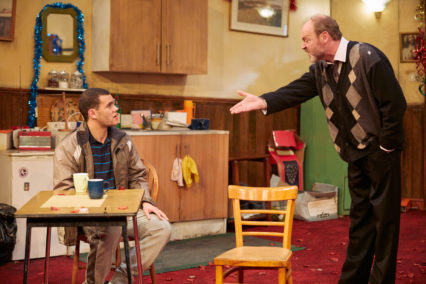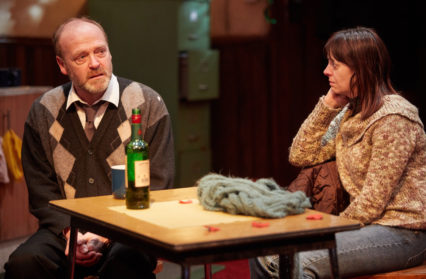Jemma Beggs reviews the latest production of Dublin Carol by Conor McPherson, inspired by Dickens’ A Christmas Carol and set in a worn and tired office on Christmas Eve starring Simon Wolfe

Inspired by Dickens’ A Christmas Carol and set in a worn and tired office on Christmas Eve, it is difficult not to question why Matthew Xia’s production of Conor McPherson’s Dublin Carol is debuting at Sherman Theatre in February instead of during the festive season. Fortunately, the play’s universality of themes, at the centre of which is the dark, dangerous path of alcoholism, saves this from being too much of a sticking point.
Whilst McPherson’s troubled characters and Lily Arnold’s detailed, run-down set are suitably Dickensian, Dublin Carol omits the transformative epiphany which lies at the heart of its namesake, instead treating the audience to a snapshot of alcoholic undertaker John’s life, complete with a visit from his semi-estranged daughter Mary (Siwan Morris), and interactions with new, young apprentice Mark (Julian Moore-Cook) who he hopes to deter from following in his drink-addled footsteps.
Simon Wolfe drives the production in his role as John, pulling the audience down into the depths as he reveals the reason he began to drink in a sudden outpouring of self-loathing: “I was in hell. I was in agony. And nobody knew.”
 Wolfe skilfully portrays the hopelessness and despair of an alcoholic, incorporating sudden outbursts of rage and defensiveness, whilst also managing to convey the dark humour rooted in so much of McPherson’s writing. Although Moore-Cook has a far less emotional character in Mark, he plays the role well with a genuineness that lends him plausibility. Siwan Morris as Mary lacks the authenticity underpinning her castmates’ characters when engaged in dialogue; her speech a shade too animated, her Irish accent a little off-key. Morris’ successes lie in the depth of emotion she conveys in her facial expressions, showing herself to be an accomplished physical actress.
Wolfe skilfully portrays the hopelessness and despair of an alcoholic, incorporating sudden outbursts of rage and defensiveness, whilst also managing to convey the dark humour rooted in so much of McPherson’s writing. Although Moore-Cook has a far less emotional character in Mark, he plays the role well with a genuineness that lends him plausibility. Siwan Morris as Mary lacks the authenticity underpinning her castmates’ characters when engaged in dialogue; her speech a shade too animated, her Irish accent a little off-key. Morris’ successes lie in the depth of emotion she conveys in her facial expressions, showing herself to be an accomplished physical actress.

Dublin Carol has a solid foundation but requires some fine-tuning. The performances here are a little rough around the edges, and some flaws in staging need to be addressed. Funeral wreaths suspended from the ceiling were not lowered enough, leaving the first word obscured to some of the audience and having the unfortunate effect of distracting from the action, instead of adding weight to it. It is initially unclear that John and Mark are undertakers and it’s difficult to ascertain the relationship between John and Mary is that of father and daughter.
Whilst the play itself has substance, Matthew Xia’s symbolism is slightly tenuous and grasping; scene changes are accompanied by petals falling from the set’s open ceiling in a nod to dirt being thrown into a grave during burial, but the effect is muted by the bizarreness of it falling unacknowledged by the characters into the play’s office setting at periodic intervals. Beautifully haunting church music is heavily featured, sometimes swelling at moments which do not appear to carry any particular significance in relation to the rest of the play, again, the clear connotation is that of a funeral. The issue lies in the overuse of the flowers and music throughout the production, rather than in the artistic decisions themselves, as visually and aurally they add value and build atmosphere, and used sparingly, could have carried far more of an impact.
Performed in a series of duologues, McPherson’s dialogue is littered with Irish colloquialisms which pull the audience into the very heart of Dublin. However, the distinct story arc tapers off in a surprisingly gentle, inconclusive ending, leaving the emotional tempest expressed by the actors to dissipate, rather than being moulded into a powerful, purposeful finale. A promising production with potential to pack a hefty emotional punch if re-examined.
To find out more about upcoming productions from Sherman Theatre visit their website.
Jemma Beggs is a regular contributor to Wales Arts Review.












